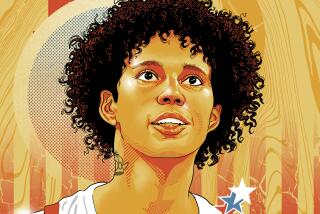Yugoslavs Send Best, Beat U.S.
SEATTLE — This is what happens when you don’t care enough to send the best.
This is what happens when the heart and soul of your national collegiate champion, Larry Johnson and Stacey Augmon of Nevada Las Vegas, take their invitations, wad them up and bank a couple of three-pointers into the circular file.
This is what happens when the best amateur jump-shooting talents in the land--Dennis Scott, Jeff Fryer, Steve Smith--never make it to the airport.
This is what happens when a 7-foot rim-crusher named Shaquille O’Neal is dispatched to terrorize teen-agers at the Olympic Festival-- the Olympic Festival --and not the Europeans at the Goodwill Games.
Losses to the Soviet Union happen.
Losses to Yugoslavia happen.
Silver medals happen.
In case the events of Seoul ’88 were forgotten, Sunday night’s gold-medal game at the Goodwill Games reminded all involved that the days when the United States could suit up the B team and still win international tournaments are gone, gone, long gone. When Yugoslavia beats the United States, 85-79, on its home court and looks impressive doing it, you know the rest of the world has caught on to the Americans’ game.
Yugoslavia beat the United States without its two top players--Vlade Divac and Drazen Petrovic--and after a third, Zarko Paspalj, went down in a heap in the five minutes with a badly sprained ankle. What kind of losses were these? Divac (the Lakers), Petrovic (Portland Trailblazers) and Paspalj (San Antonio Spurs) all played the NBA last season.
The best of the rest, 6-11 center Dino Radja, scored only nine points after sitting out most of the second half because of foul trouble.
So, Yugoslavia pretty much was down to the junior varsity--and the United States still had to look up on the victory stand.
“Basketball all around the world has grown up,” said Dusan Ivkovic, coach of the turbo Yugos, “and now is very, very close with American college basketball. American people must understand that now.”
American people may not understand how Coach Mike Krzyzewski got off the plane in Seattle, looked around and claimed to be satisfied with the backcourt he brought north.
The Americans played the entire tournament without a legitimate shooting guard; when Arkansas’ Lee Mayberry proved a bust, forward Todd Day replaced him in the starting lineup. And when the All-American point guard, Kenny Anderson, succumbed to a severe case of spotlight jitters, the U.S. outside game went out to lunch.
No team in the eight-country Goodwill field shot as poorly as the United States, which finished the five-game tournament at 38%. And the Americans saved the worst for last. Sunday, the U.S. backcourt was a combined five for 31. Day was one for 12. Anderson was three for 10. Mayberry, who missed all five shots in Tuesday’s upset defeat to the Soviets, proved to be no fluke and came back with a crisp one for five against Yugoslavia.
The United States trailed most of the game--by three points at halftime and by 72-65 with six minutes left.
Then, Yankee ingenuity hit a new low.
Jurij Zdovc, Yugoslavia’s leading scorer with 21 points, stood at the free throw line and clanked a foul shot off the heel of the basket. The Americans couldn’t wait to rebound. Mark Randall came crashing in from the left side. Doug Smith powered in from the right.
Both players tipped the ball . . . into the basket.
For the Americans, it was the play of the tournament--the definitive play of the tournament.
Maybe they should have tried the same thing when one of their guards cast off one of their bricks.
Through Yugoslavian foul attrition--first Radja fouled out, then Radisav Curcic (10 points)--the United States hung in long enough to pull within 81-78 with 1:48 to play.
Yugoslavia missed a shot.
The Americans rebounded and passed to Doug Smith, who drove inside and missed. Billy Owens rebounded and whipped the ball back to Smith.
The ball hit Smith right in the hands and bounded out of bounds.
The clock showed 42.2 seconds.
Yugoslavia retaliated with a basket by Zoran Savic, its lead was 83-78 and the Americans were on their way to their second defeat in four games.
Krzyzewski, of course, blamed the defeat on the Americans’ youth and the Yugoslavs’ savvy. “Our kids are young and still not cohesive,” he said. “I think it’s fine for the U.S. to (expect the gold medal) and work towards that, but we also have to be realistic and know that there are foreign players in the NBA and that the foreign players are men and that there’s a possibility we could lose to them.”
Krzyzewski used the same routine after the Soviet defeat. He said his United States team was using the Goodwill Games to tune up for next month’s world championships in Argentina.
By then, Divac and Petrovic will be back in Yugoslavian uniforms. The Soviet Union expects to regain one or two of its Lithuanian gunners.
Tune up? Has Krzyzewski considered trading in this lemon?
Good thing the Olympics remain two years in the distance. By then, the Americans plan to arrive, for the first time ever, with NBA players on the roster.
Michael Jordan and Magic Johnson ought to be able to take care of that backcourt problem.
More to Read
Go beyond the scoreboard
Get the latest on L.A.'s teams in the daily Sports Report newsletter.
You may occasionally receive promotional content from the Los Angeles Times.






